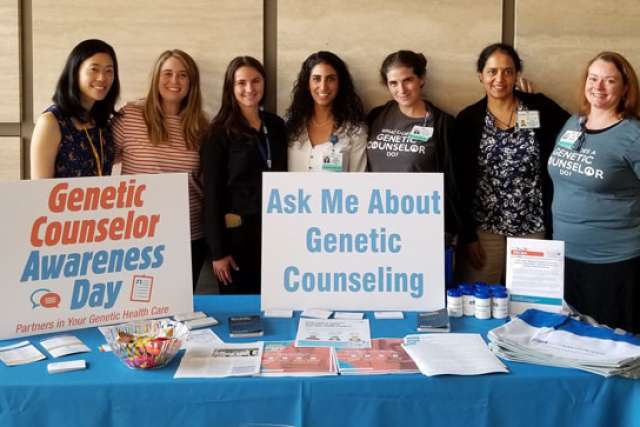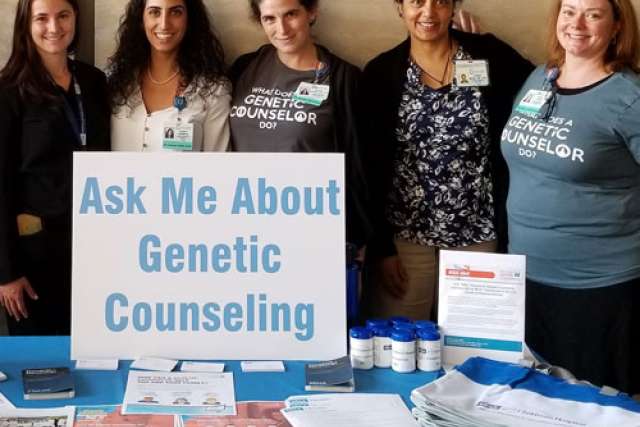Research on the human genome has revealed that nearly all diseases have a genetic component caused by gene mutations present at birth or the interaction between genes and the environment. This research has given rise to genetic tests that help diagnose, predict risk and guide treatment for certain hereditary conditions. At UCLA, genetic counselors guide patients and their families through the complex, sometimes difficult decision-making processes related to this new information.
“We help optimize our patients’ potential,” says Naghmeh Dorrani, MS, LCGC, who has provided genetic counseling to UCLA patients for 20 years in both clinical and research settings. Among those most interested in genetic counseling are parents who want to understand childhood developmental delays, such as autism spectrum disorders, and want to assess their risk for having another child with the disorder; people with a family history of cancer, cardiovascular and neurological disorders; and people with high-risk pregnancies due to advanced maternal age or personal or family history of genetic disorders.
There are twelve masters-trained, board certified, and licensed genetic counselors working with patients at UCLA in the Department of Pediatrics Division of Genetics, Prenatal Diagnosis Center and the Department of OB/GYN, UCLA Jonsson Comprehensive Cancer Center, Departments of Neurology and Cardiology, and in the research setting of the Undiagnosed Diseases Network, a NIH-funded research study in the Department of Human Genetics.
“We help patients and their families understand and adapt to the medical, psychological and familial implications of complex genetic conditions so they can make informed decisions about their genetic health, and in this way, we are their advocates” says Jessica Kianmahd, MS, LCGC. “Genetic counselors also explain issues related to accuracy, specificity, privacy and confidentiality of genetic testing and discuss how to effectively share genetic information with other family members.” The process of genetic counseling includes interpretation of family and medical histories to assess the chance of disease occurrence or recurrence, a physical examination by a medical geneticist (when indicated), genetic testing and explanation of results, education about a genetic diagnosis and its natural history, as well as case management and referrals to other appropriate resources.
Judy Fan, MS, LCGC has advanced training in cardiovascular risk assessment and works one-on-one with patients and families affected by conditions such as inherited cardiomyopathies and arrhythmias, familial thoracic aortic aneurysms and dissection, and familial hypercholesterolemia. She helps them understand how the genetics of their cardiac condition impacts their health and that of their family members. The process includes interpretation of genetic test results, discussion of inheritance patterns, education on the type and frequency of familial cardiac screening, and addressing psychological implications of living with an inherited heart condition.
Genetic testing has dramatically advanced in the last decade. Through chromosomal microarray, panels, and whole exome sequencing, genetic tests can help geneticists and genetic counselors understand the etiology of genetic disorders to guide treatment, management, and risk assessment.
Other developments make it possible to offer women with higher-risk pregnancies, including those 35 and older, highly accurate, non-invasive prenatal blood testing, without the risks associated with amniocentesis and chorionic villus sampling.
“Women can now be screened earlier and faster for chromosomal abnormalities that may cause major birth defects or severe intellectual disabilities without undergoing an invasive, possibly risky procedure,” says India Bradley, MS, LCGC. “Genetic counselors can help women understand their testing options and results, as well as the implications of these results and available options based on this information.”

The next step, according to UCLA cancer genetic counselor Rachel Shapira, ScM, LCGC is to personalize genetic counseling. “As we learn about more genes and their interactions with regard to cancer, we can begin to tailor the discussion so it is more specific to each individual,” Shapira says. “People may inherit genes that place them at increased risk for certain cancers, but may also inherit other genes that modify their risk. All of that information, as well as personal and family experiences with cancer, will be important in patients’ decision-making processes.”
Genetic counselors at UCLA service the following multi-disciplinary clinics:
- (Pediatric Cancer Predisposition Clinic, Autism Spectrum Disorders Clinic, and Metabolic Genetics)
- Adult Genetics (general genetics, Craniofacial, 22q/DiGeorge syndrome, ASXL gene disorders)
- Prenatal Genetics
Need help finding a genetic counselor? Call us at (800) UCLA-MD1 or



